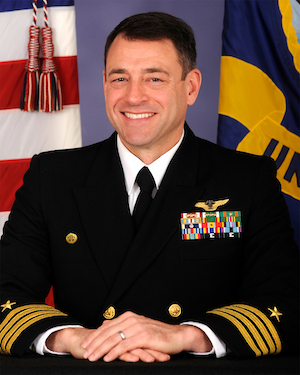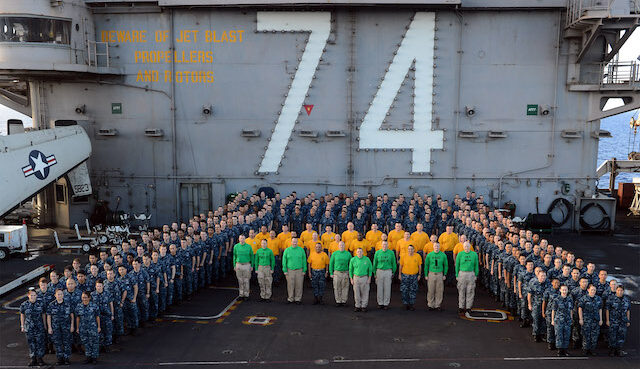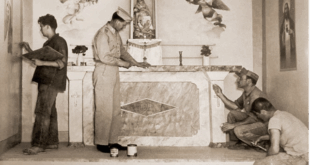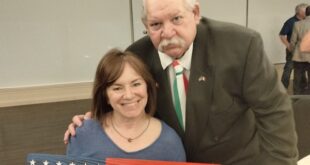Initially enlisting for a four-year term, James Belmont is approaching 30 fulfilling years in the Navy, with 15 different jobs and four tours on aircraft carriers under his belt.
James M. Belmont was born in Highland Park, Illinois, to James and Barbara Brain Belmont. He has one sister. Belmont was 15 years old when the family moved to Deerfield.
In 1901, his great-grandfather, Luigi Belmonte, emigrated to Chicago’s Little Italy from Castrolibero, a small town in Calabria. He went home to marry his sweetheart in 1906, and when they returned to the Chicago area in 1913 and settled in Winnetka, the letter “e” was somehow dropped from the last name.
The extended Belmont family lived in the north suburbs, and they visited each other regularly. His grandmother and grandfather prepared traditional Italian foods. “I remember the big eight-quart pots of sauce that she would make, and that passed on to my father and mother who would do the same,” Belmont says. “I remember fondly the cannolis and the tiramisu … always a big favorite of mine.”
Belmont attended Lincoln Grade School through fifth grade and graduated from Sacred Heart Grade School and Loyola Academy. At Lewis University, he studied to be a pilot and earned a bachelor’s degree in aviation science. Belmont grew up living between Great Lakes Boot Camp and Glenview Naval Air Station. “I knew that I wanted to not only fly, but be part of the military,” he says. Watching the Blue Angels and the Air Force Thunderbirds fly over the lakefront during Taste of Chicago also inspired him. “I absolutely knew that that’s what I wanted to do,” Belmont says. His grandfather served in the Armored Division during World War II, and his father served in the Army during the Vietnam era.
While at Lewis, Belmont approached Marine recruiters hoping to become an officer and fly with them, only to be disappointed when he did not pass the entrance interviews. “Desert Storm was going on, and I had the feeling that I needed to do something in the military,” says Belmont. Belmont later learned he was color blind, which prevented him from flying with the military. Frustrated at not getting a commission from the Marine Corps, Belmont enlisted in the Navy. He graduated from Lewis in May 1994 and one month later reported to Great Lakes Boot Camp as an enlisted man, completing an eight-week course in basic naval training. Before going to boot camp, Belmont took a series of aptitude tests. “They use the scores to find out what jobs suit you best, as well as the training that you have prior to going to boot camp,” he says.
 Following boot camp, Belmont went on to the Naval Air Station in Meridian, Mississippi, for two months of Aviation Administration Training, where he learned administrative and clerical skills. “I had a guarantee. I knew I was going to have a job. I was an aviation administrationman who basically worked for the Aviation Maintenance Officer,” says Belmont. As such, he performed various jobs, including maintaining personnel records, quality assurance and maintenance administration.
Following boot camp, Belmont went on to the Naval Air Station in Meridian, Mississippi, for two months of Aviation Administration Training, where he learned administrative and clerical skills. “I had a guarantee. I knew I was going to have a job. I was an aviation administrationman who basically worked for the Aviation Maintenance Officer,” says Belmont. As such, he performed various jobs, including maintaining personnel records, quality assurance and maintenance administration.
After a year or so as an enlisted man, an officer said to Belmont, “You know, you’re doing our job. I don’t understand why you’re an enlisted man. You should be an officer.” In March 1996, Belmont submitted an application to become an officer and in July was accepted for a direct commission through Officer Candidate School in Pensacola, Florida. After completing the course, he had a “follow on” of two months of Aviation Maintenance Officer School. Belmont’s father initially was not too pleased when his son enlisted in the Navy after he spent so much money on college tuition. “When I got my commission, he came to me and told me that was the proudest moment of his life,” says Belmont.
Belmont enlisted in the Navy for the four-year term with a sense of being patriotic and serving his country as well as finding out what his future might hold. “But I think within the first one or two years, I knew my calling was to be in the Navy, whether I did 10 years, 20 years or what’s now coming up, 30 years,” he says. “Once I got commissioned, that solidified that I was going to stay in for at least 20,” says Belmont. The duties he first performed as an aviation administrationman set the building blocks for what he is today. “So by the grace of God, things turned out the way they did, and almost 30 years later, I’m still in [the Navy] doing what I really enjoy,” Belmont says. He adds that, “I knew what it was like to be an enlisted man and was able to bring that as an officer and understand what kind of goes on in the hearts and minds of an enlisted man, rather than going into a direct commission and maybe missing out on that opportunity.”
Through the years, Belmont has been promoted in rank from Ensign to Captain and currently serves as the Commander of the Fleet Readiness Center East (FRCE). “I was blessed to do a tour up at the Pentagon. That was very enlightening,” says Belmont. He has had at least 15 different jobs and completed four different tours on aircraft carriers during this time. “I’d say about 70 percent of my 30 years has been on the operational side,” Belmont says. “Every job I’ve done has had something to do with the aircraft, the engines that go in the aircraft or the components that go in those aircraft.”
Belmont has had many assignments. “I’ve been everywhere,” he says. Among them are Maintenance Control Officer in charge of a squadron of aircraft, Carrier Airing Maintenance Officer in charge of eight different squadrons and their maintenance, and Aviation Intermediate Maintenance Department Officer in charge of 320 sailors and officers on board an aircraft carrier, overhauling parts for various aircraft.
Belmont was involved in five campaigns in the war on terrorism: Operation Northern Watch in Turkey; Operation Southern Watch in Prince Sultan Air Base, Saudi Arabia; Operation Enduring Freedom; Operation Iraqi Freedom; and Operation New Dawn. During the first two campaigns, Belmont was land based; he was on carriers during the others. He was responsible for keeping every aircraft on board in top running order, a monumental duty. Now that the war on terrorism is over in the Middle East, Belmont looks back and feels a great sense of pride for having been involved in those campaigns.
The carriers hold about 70 aircraft — fighter jets, surveillance planes and helicopters — and they provide support for troops on the ground. “You see the aircraft go to its mission wherever that might be, and then you wait for them to come back,” Belmont says. “When they come back and land on the carrier, you get a sense of accomplishment that, even though the jobs that the people who work for me did might have been something insignificant, we had a hand in whatever that mission was.” He adds, “That, at the end of the day, was probably the reason why I enlisted, to do the bidding of the United States wherever that might be.”
Capt. Belmont has been in his current position at FRCE since April 2022 and is designated as a Professional Aviation Maintenance Officer. He oversees about 4,300 people that work in the equivalent of a billion-dollar industry. “We are a maintenance, repair and overhaul organization servicing eight different types of aircraft, their associated engines and the components of those aircraft,” he says. They take aircraft that have flown in some of the harshest environments imaginable, for prolonged periods, and within a relatively short time frame, overhaul and return them back to the fleet looking showroom new. “There’s a great accomplishment in that,” Belmont says.
Approximately 100 aircrafts are serviced each year in addition to 80-plus engines and more than 13,000 components. It is Belmont’s responsibility to determine what repair/maintenance/service jobs are worked on first. “I have to look at the needs of the fleet to find out what needs to get priority,” he says. “The needs of the military, whether it’s the Department of the Navy or the Department of the Marine Corps.” Every aircraft that comes through FRCE is returned to the fleet to be put into an operational status anywhere in the world. Additionally, FRCE sends teams out to forward-deployed ships and stations to work on aircraft that need to be serviced.
Belmont had the opportunity to visit many ports throughout the world on his carrier tours. Some of the countries he visited were Singapore, Malaysia, Greece, England and Italy. He spent four days in Naples, Capri and Calabria. Everywhere he went, the military was warmly welcomed, despite any language barrier.
Belmont is married to Kari Roper Belmont, and she has three grown children. Over the years, he has been awarded the Meritorious Service Medal (five awards), Navy/Marine Corps Commendation Medal (four awards), Navy/Marine Corps Achievement Medal (two awards) and John C. Stennis “Straight Furrow,” in addition to numerous campaign, service and unit awards. Belmont, who is looking forward to retiring after 30 years of service, reflected on his successful career. “Every tour has been absolutely amazing,” he says. “I wouldn’t change anything or any of the places I’ve gone. I’ve been blessed. By the grace of God, He sent me to the places where I was safe. I never felt unsafe in any of the tours I did. And it just kind of carried me and guided me throughout the last 30 years to excel and do the best that I could. (I’ve also been blessed) due to the opportunity to excel and to make a commitment to the Navy.
“At the end of the day, I’ve been very blessed with everything,” Belmont concludes. “I couldn’t have scripted a better career.”
The above appears in the July 2023 issue of the print version of Fra Noi. Our gorgeous, monthly magazine contains a veritable feast of news and views, profiles and features, entertainment and culture. To subscribe, click here.
 Fra Noi Embrace Your Inner Italian
Fra Noi Embrace Your Inner Italian






